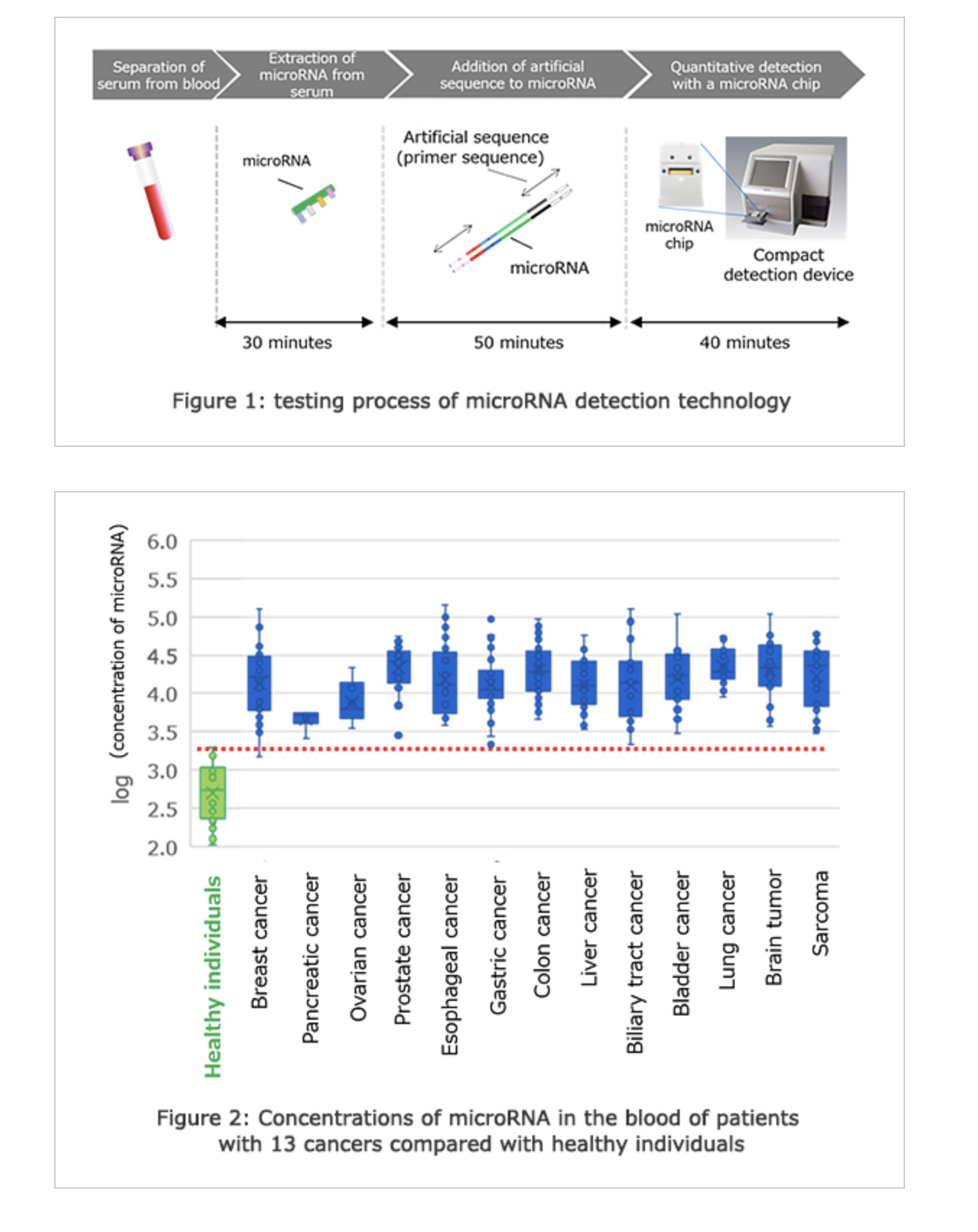Toshiba has introduced a groundbreaking test that can identify 13 different types of cancer with an impressive 99% accuracy using just a single drop of blood.
Toshiba Corporation (TOKYO: 6502) has unveiled an innovative cancer detection technology that leverages microRNA (referred to as microRNA) found in blood. Using a unique electrochemical microRNA detection method, the company has successfully demonstrated the ability to accurately distinguish between healthy individuals and patients with 13 different types of cancer, including pancreatic and breast cancer.
This groundbreaking technology achieves an impressive 99% accuracy rate in under two hours during research and development testing. Toshiba plans to conduct verification tests in 2020 with the aim of swiftly integrating this technology into our society.Further insights into this cutting-edge technology will be presented at the 42nd Annual Meeting of the Molecular Biology Society of Japan, in Fukuoka.
Cancer has been the leading cause of death in Japan since 1981(Note 2), and claimed approximately 370,000 victims. Today, the probability of a Japanese developing cancer at some point in their lifetime stands at 62% for men and 47% for women(Note 3). However, advances in treatment have won dramatic improvements in survival rates, as long as the cancer is detected at early stage. For example, in lung cancer, the 5-year survival rate is approximately 60% for stage II cancers, but as high 97% for stage 0(Note 4). Early detection is crucial.

MicroRNA, small non coding RNA molecules, has attracted attention as a reliable marker for cancer. Humans have roughly 2,500 types microRNA in their blood, and their activity provides the basis for analysis. Toshiba developed its microRNA-based cancer detection technology through participation in the Japan Agency for Medical Research and Development’s Project Focused on Developing Key Technology for Discovering and Manufacturing Drugs for Next-Generation Treatment and Diagnosis, a development program focused on developing the foundations of microRNA measurement technology in bodily fluids(Note 5).
In a collaborative effort, Tokyo Medical University and the National Cancer Center Japan teamed up with Toshiba to apply advanced medical knowledge regarding microRNA to test Toshiba’s microRNA detection technology. The results were nothing short of remarkable, as they were able to accurately differentiate between samples from healthy individuals and those indicating the presence of any of the 13 different cancers, achieving an impressive 99% accuracy rate. Notably, this included samples from the earliest stage of cancer growth, known as stage 0, even before it had a chance to spread.
These findings hold great promise and mark a significant step towards creating a straightforward and highly accurate screening tool for the 13 types of cancer. By combining a microRNA chip with compact, specialized testing devices, the testing time can be reduced to less than two hours, allowing for same-day results.
Toshiba’s strategic initiative, the Toshiba Next Plan, unveiled in November 2018, signaled the company’s strong re-entry into the medical sector, with a primary focus on precision medicine that emphasizes the early detection of medical conditions and the provision of individualized treatment. This newly developed microRNA detection technology represents a breakthrough in achieving early cancer detection with exceptional accuracy, ultimately enabling early intervention that can enhance survival rates and improve the quality of life for patients.
—————————————————————————————————
(Note 1)
microRNA
microRNA molecules, short nucleic acid molecules (consisting of about 20 bases) that regulate genes and proteins in the body, are known to be stable in blood. Examination of the types and quantity of microRNA in blood has recently been found to potentially enable early detection of various cancers such as lung cancer and breast cancer. This discovery has created anticipation for microRNA as a novel diagnostic marker.
(Note 2)
Cancer is the leading cause of death among Japanese people
The leading causes of death in 2018 were as follows. #1: Cancer (malignancies; tumors), 373,547 deaths (mortality rate per 100,000 population: 300.7); #2: Heart disease (not including hypertensive heart disease), 208,210 deaths (167.6 per 100,000 population); #3: Old age, 109,606 deaths (88.2); #4: Cerebrovascular disease, 108,165 deaths (87.1).
Cancer (malignancies’ tumors) is responsible for an increasing number of deaths every year, and has been the leading cause of death every year since 1981.
https://www.mhlw.go.jp/toukei/saikin/hw/jinkou/geppo/nengai18/dl/gaikyou30.pdf (Ministry of Health, Labor and Welfare)
(Note 3)
Cumulative morbidity risk based on 2014 nationwide estimations (Cancer Information Service, National Cancer Center) https://ganjoho.jp/reg_stat/statistics/stat/summary.html
(Note 4)
Haigantouroku Goudou Iinkai 5-year postoperative survival rates in lung cancer based on 2010 nationwide lung cancer registry data
Journal of Thoracic Oncology 14, 212-222 (2019)
(Note 5)
Medical Research and Development’s Project Focused on Developing Key Technology for Discovering and Manufacturing Drugs for Next-Generation Treatment and Diagnosis
A project conducted from 2014 to 2018, lead by the National Cancer Center. This project comprehensively analyzed the relations between serum microRNA and 13 different cancers with the goal of early cancer detection.
https://www.ncc.go.jp/jp/information/pr_release/2014/0613/index.html (Cancer Information Service, National Cancer Center)
